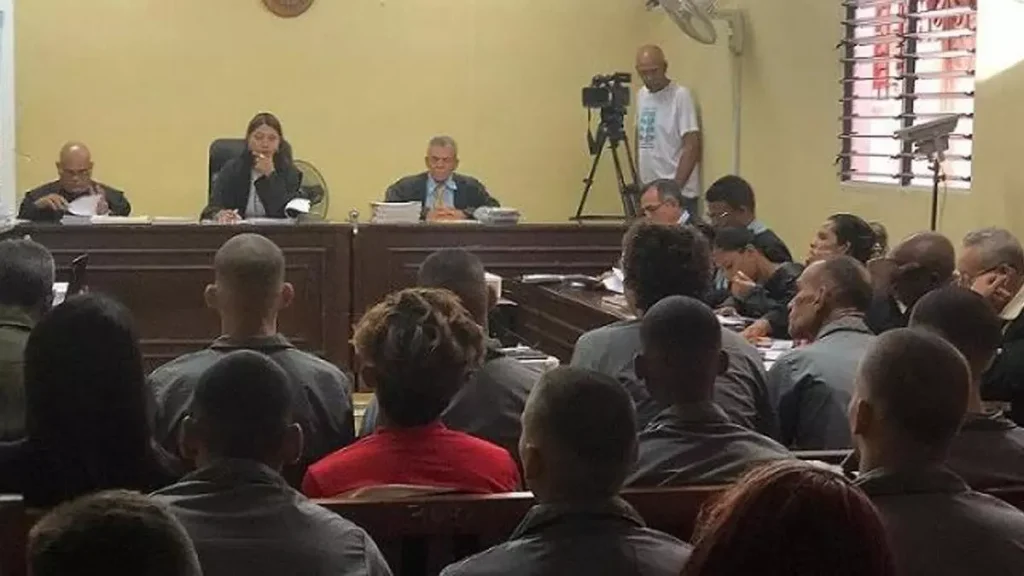- The protestors of March 17, 2024 shouted “we want electricity,” homeland and life” and “freedom”
- This Tuesday there was a 2,052 megawatt deficit of electricity, the second largest recorded

![]() 14ymedio Havana, September 17, 2025 — On Tuesday, the Municipal Court of Bayamo, in Granma province, held trial proceedings for 15 of the 16 Cubans arrested for the protests that occurred in this eastern city on March 17, 2024. According to a brief article published in the official press, they are charged with the offenses of “public disorder, attack, resistance, contempt of court, illegal carrying and possession of weapons, disobedience” and “incitement to delinquency.”
14ymedio Havana, September 17, 2025 — On Tuesday, the Municipal Court of Bayamo, in Granma province, held trial proceedings for 15 of the 16 Cubans arrested for the protests that occurred in this eastern city on March 17, 2024. According to a brief article published in the official press, they are charged with the offenses of “public disorder, attack, resistance, contempt of court, illegal carrying and possession of weapons, disobedience” and “incitement to delinquency.”
A total of 13 of them are being held in pre-trial detention, and the remaining three are “under non-custodial measures of record and prohibition to leave the country.” Although the State newspaper Granma does not explain the reasons, it reports that this is a “partial” trial against 15 of the 16 accused. It also does not indicate the prosecution’s request for sanctions.
As is customary in this type of article, the government clarifies that the Constitution and the penal laws in force guarantee that “the procedural guarantees and the right to defense of the accused are respected during the proceedings,” although there are numerous organizations inside and outside Cuba that have systematically denounced the irregularities in the trials of demonstrators, such as those of 11 July 2021 [’11J’].
Last year’s Bayamo protest was not the only one that took place on March 17, and they resembled those of ’11J’.
Last year’s protest in Bayamo was not the only one that took place on March 17; there were also demonstrations in Santiago de Cuba and Holguín that resembled those of ’11J’. They took place on a Sunday and also began with shouts of “we want electricity,
The photos disseminated on social networks also showed the participation of hundreds of people.
That day, in an unusual gesture, Cubadebate offered explanations of what was happening in Santiago de Cuba in a Facebook post. “As a result of long hours of power cuts due to the unavailability of fuel and other situations resulting from the current economic crisis, several people took to the streets and a demonstration occurred,” admitted the official press.
According to the same publication, “the people who were demonstrating asked for electricity and food,” and, it conceded, “isolated cries of Patria y Vida were also heard from small groups within the mass of people,” although it immediately qualified that “they were not followed by the majority.”
Cubadebate also acknowledged the presence of Security Forces but said that “no police intervened, as can be seen in the photos. They are only guarding the demonstration and talking directly with citizens, in the exercise of duty, but allowing the demonstration to take place in complete freedom.” It also reported the presence of Beatriz Johnson Urrutia, governor of the province, and other officials “to dialogue with the population and pay attention to the complaint.”
Just this Tuesday, once again there was an electricity deficit of more than 2,000 megawatts (MW) in the country, specifically 2.052 MW.
At the time, there were reports of police repression only in Bayamo. A video of the protests in that city recorded, on Sunday night, a group of citizens struggling with several policemen while others ran to avoid the blows. Other videos, shared by La Hora de Cuba, showed, in earlier hours, a protest with hundreds of people chanting “homeland and life.” This independent media reported that the whole city was militarized. A third video showed several patrols blocking a street to prevent demonstrators from continuing the march.
The next day, President Miguel Díaz-Canel made it clear that the regime’s position would be the same as on other occasions. In a follow-up to messages on the social network X, he commented on the demonstrations saying that they had “destabilizing purposes” and had been carried out by “terrorists based in the U.S.”
Unlike the official reaction after the 11J protests, the Cuban authorities kept a cautious tone in their statements, and, in fact, during this year and a half, nothing had been known of these detainees until now. But now is not just any moment.
Just this Tuesday, the country again exceeded 2,000 megawatts (MW) of electricity deficit, namely 2,052 MW — the previous record of 2,054 MW was on July 21 — and for this Wednesday, the Electric Union of Cuba again predicts a high deficit for the afternoon-night peak hours. At that time, the demand will be 3,500 MW and the availability only 1,580 MW, so there will be a shortage of 1,920 MW and an actual effect of 1,990 MW; that is to say, there will not be 57% of the energy required.
For Cubans, the numbers translate into stress, lack of sleep and despair. The trials are a warning to citizens of what can happen if they are go massively into the streets to protest.
Translated by Regina Anavy
